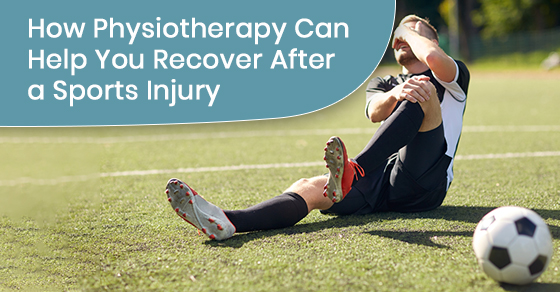If there is one thing that aspiring and professional athletes fear most, it is sports injuries. Depending on their severity, injuries can crush an amateur’s dreams of going pro. But not all injuries are fatal or permanent. The more common variety of injuries allow most people to return to peak performance with the right treatment.
For fast healing and recovery following a sports injury, we recommend physiotherapy treatment. Depending on the type of injury and its treatment, sports therapy can relieve postoperative pain and pressure points, and in the process, restore or improve range of motion. Beyond injury rehabilitation, sports therapy supports regular conditioning for posture correction, muscle strain relief, and resistance build-up to prevent future injuries.
Did you recently suffer an injury? Don’t let it take away your love of the game or end a promising career. Whether you’re a budding athlete or a pro player, here’s how sports therapy in Thornhill can aid in your recovery and help you become the best athlete you can be:
What is sports therapy and why do athletes need it?
You don’t have to be a pro athlete to experience the sharp pain of a cramp or muscle strain and its lingering discomfort; virtually any activity that involves over-exertion or balance can strain your muscles and joints. However, for athletes, the pressure to recover is much higher: they need their bodies in peak condition to stay in the game.
This type of physiotherapy is explicitly designed for athletes who suffer from sports injuries and need to treat specific muscles and joints on which their career rests. Sports therapy involves physical exercises for retraining muscles and restoring an optimal range of motion.
While starting as a rehabilitative treatment, athletes can continue with sports therapy for conditioning and endurance building, which reduces their susceptibility to future injuries in the same area or other parts of the body.
Benefits of Injury Rehabilitation with Sports Therapy
The health and wellness benefits of sports therapy are endless. Not only does it allow athletes to recover faster, but it also builds them back up to be healthier and better through endurance training and increased flexibility:
1. Improve muscle and joint flexibility
Whether you’re a swimmer, runner, or a football or basketball player, sports therapy allows you to regain pre-injury strength and flexibility and even build up your endurance through ongoing conditioning.
Sports therapy helps athletes like you improve their range of motion, which can be severely diminished by a traumatic injury, and strengthen your muscles and joints to enhance resistance against future injuries.
Physiotherapists help athletes improve flexibility through a range of stretching and conditioning exercises. These reduce the risk of strain even from the roughest plays once they’re back on the field.
2. Accelerate recovery
Injuries cause bruising, swelling, and immense pain in muscles and joints essential to movement like running, swimming and jumping. When an athlete is injured, they can’t participate in these activities and must recover before returning to the game. That’s why severe injuries can end careers — and are feared most by athletes at peak performance.
Along with surgery, casts, and medication, sports therapy promotes muscle repair and healing so that athletes can regain pre-injury strength, flexibility, and motion range. From controlled exercises like stretching to massages and administering ice packs, sports therapy reduces swelling, increases blood flow and nutrient delivery, and provides long-term pain relief.
Sports therapy also raises endorphin levels in the brain, which helps ward off stress and block pain signals. As a result, athletes are more resilient and are less susceptible to injuries and pain.
3. Relieve sore muscles
What do you do with sore points? You rub and massage them for relief. People of all ages and fitness levels suffer from the occasional muscle strain and soreness — especially athletes who are always active and exerting their muscles.
Sports therapy treats muscle soreness caused by overtraining and stress. It’s especially helpful for those athletes just getting back on the field or starting a new exercise regimen. Sports therapy programs include conditioning exercises and massages to treat pain and inflammation. Combined with safe exercising techniques, sports therapy allows athletes to train longer and harder without experiencing discomfort or accidentally straining their muscles. You can find that many clinics that use physiotherapy marketing services often have sports therapy as a treatment option.
4. Injury prevention
Sports therapy isn’t just rehabilitative — its most significant benefit is in long-term strengthening and injury prevention. Physiotherapists can offer advice on exercising safely, avoiding injuries, training continuously, and improving endurance. Therapists can even customize workouts for strengthening and flexibility, so athletes can effectively work out weaker spots.
With regular conditioning, strengthening, and flexibility exercises, sports therapy can help them grow resilient, so they can easily exert more energy in winning plays while reducing susceptibility to future injuries. Simply, because their muscles and joints are conditioned, they’re less likely to strain or injure with regular movement and exertion.
5. Boost athletic performance
The best players are healthy players, and that’s what sports therapy guarantees. More than buzzer-beater plays and sheer strength, athletes go on to win titles because they follow proper nutrition, get enough rest, and recover from minor injuries faster.
Sports therapy boosts recovery, and in the process, helps athletes grow more robust and play better with improved movement patterns, corrected muscular imbalances, and increased mobility. Sports therapy achieves this through a combination of exercises that boost functional fitness and motor control, which makes core and back muscles stronger, joints more flexible, and reaction times shorter.
To learn more about how sports physiotherapy in Thornhill can help you recover from an injury, call PhysioActive at (905) 695‐0371 or contact us here.






